Alexey Maresyev. The story of a real man
Alexei Maresyev will remain in the public mind thanks to inhuman endurance and the will to live. The feat perfect for them was worthy of both a separate book and a film made on it later. After an 18-day return to his crawling through the forest, frostbite and amputation of both legs, this man did not break down and did not give up. He not only stood on the prosthesis, but also returned to Aviation: in itself, it was akin to a miracle. But Maresyev not only returned to heaven, he returned to the fighter unit, continuing to fight for the freedom and independence of his homeland.
Alexey Petrovich Maresyev was born 20 May 1916 of the year in the city of Kamyshin, Saratov Governorate. Alexei and his two brothers, Peter and Nicholas, raised his mother. The father of the future pilot, past the battles of the First World War, died from the effects of numerous wounds when Alexei was only three years old. In childhood, Maresyev did not have a special health, the boy was often sick and suffered a severe form of malaria, the consequence of which was rheumatism. Alexei was tormented by terrible pains in the joints, and the neighbors of his family whispered among themselves that he would not last long. However, from his father, whom Aleksey practically did not know and did not remember, he inherited an enormous willpower and stubborn character.
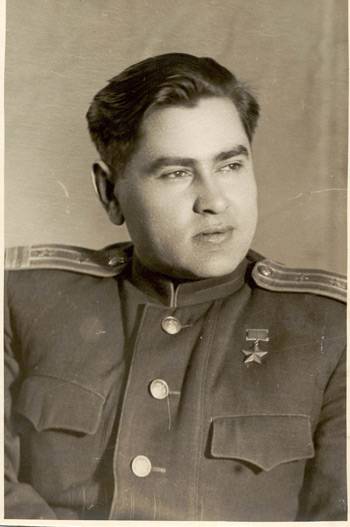
After graduating from 8 classes of high school in Kamyshin, Alexei Maresyev received a specialty metal turner at a local school at a sawmill. Here he began his career. Twice at this time he applied to the flight school, but both times they were returned back, referring to his health. In 1934, the Kamyshin District Komsomol Committee sent the future hero to the construction of the city of Komsomolsk-on-Amur. It was in the Far East that, without a break from work, Alexey began to study at the flying club, after all having realized his craving for heaven, which had arisen in it as a child.
In 1937, he was drafted into the army. He initially served in the 12 airborne squadron located on Sakhalin Island, but was then transferred to the 30 th Chita military pilot school, which in 1938 was transferred to Bataysk. Bataysk Aviation School named after AK Serov Maresyev graduated in 1940 year, receiving the rank of junior lieutenant. After graduating from college, he was left there as an instructor. It is in Bataysk that Maresjev will meet the beginning of the Great Patriotic War.
After the start of the war, the pilot was sent to the South-Western Front, where he fought as part of the 296 th Fighter Aviation Regiment. He made his first sortie 23 on August 1941 of the year in the Krivoy Rog area. The first months of the war were a very difficult time for the entire Red Army and Soviet aviation. The Germans surpassed the Soviet pilots in accumulated experience, in the level of ownership of the equipment on which they flew for a long time, as airplanes. Maresyev was saved by the fact that he was already an experienced pilot. And although he didn’t chalk up his victories in 1941, he survived. Later, the famous Soviet ace Alexander Ivanovich Pokryshkin said that those who did not fight in 1941-1942 did not know the real war.
He shot down his first German aircraft, the Ju-52 transporter, at the start of the 1942 of the year. In March, 1942, Alexei Maresyev was sent to the North-Western Front, by which time he had already shot down the 4 German aircraft. It was here that an air battle occurred that would forever change his life.
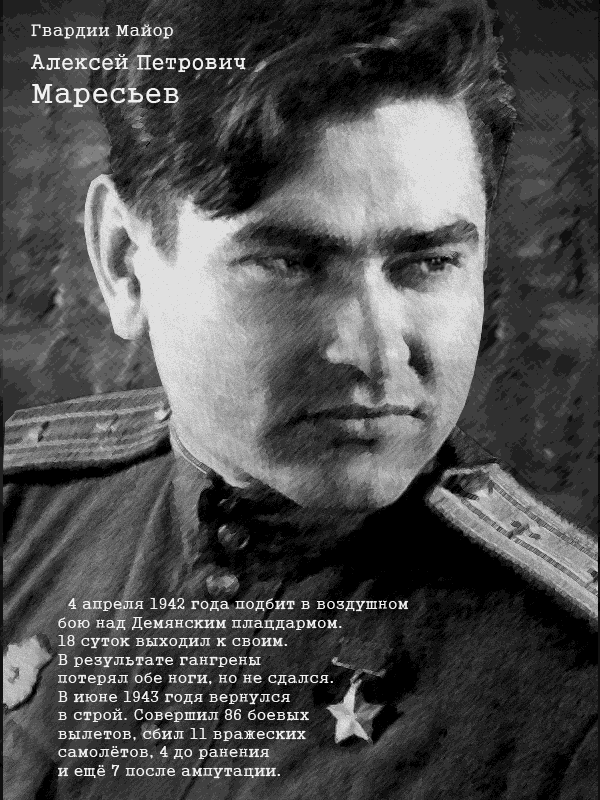
In the spring of 1942 between the Seliger and Ilmen lakes, Soviet troops near the inconspicuous small town of Demyansk surrounded an approximately 100-thousandth group of German troops that did not think to surrender, providing organized and very strong resistance. 4 April 1942 of the year in the area of this so-called "Demyansky boiler" during the flight to cover the bombers in a battle with German fighters the Yak-1 Maresyev plane was shot down. He tried to make an emergency landing in the forest, spotting a suitable lake there. However, his plane caught the landing gear over the tops of the pines and turned over. The plane fell into deep snow, and the pilot himself was seriously injured, but he remained to live.
For the whole 18 day, the pilot who had injured his feet, first on crippled legs, and then crawled to the front line crawling. Having eaten on the way onboard rations, he ate what could be found in the forest: tree bark, berries, cones. The situation seemed hopeless: having found himself alone in the midst of the endless and dense forest, the pilot with injured legs simply did not know where he should go, or rather crawl. How he remained in the end alive, no one knows. Alexey Petrovich never liked to remember this story and tried not to talk about it. According to him, at that moment he was motivated by an indomitable desire to live.
In the end, he still got to his. Near the village of Plav, Kislovsky Village Council of the Valdai District, he was noticed by his father and son, local residents. As the pilot didn’t respond to the questions by that time, the father and the son came back to the village from fear, thinking that they were German. Only later, the children from the same village, Sasha Vikhrov and Seryozha Malin, were barely able to find a living pilot, who determined that they were a Soviet pilot, and with the help of Sasha’s father drove the wounded pilot to their home. The villagers took care of Maresyev more than a week, but that needed qualified medical assistance. In early May, an airplane landed near the village, and Maresyev was transported to a hospital in Moscow.
On this story Alexei Petrovich could come to an end. By the time of delivery to Moscow, the pilot was already in critical condition, he had gangrene. At the same time, there were quite a few wounded in the hospital, so the fighter pilot brought in as practically hopeless was laid on a gurney in the corridor. Here, while making a detour, Professor Terebinsky accidentally turned his attention to him, who eventually saved his life. True, it had to be paid for by amputation of both legs in the lower leg area. There was simply no other way out; by that time, Maresyev had begun to develop gangrene incompatible with life.
Amputation of both legs, it would seem, put a fat point on the career of a pilot. However, Maresiev was not going to give up. He did not accept the idea that he would have to part with the sky, making a decision for himself to return to aviation and fly again at any cost. Having accepted this, he began almost immediately to train: walk, run, jump and, of course, dance. True, he had to learn to dance again not with the nurses in the hospital, who were afraid that he would crush their feet with his insensitive prostheses, but with his neighbors in the hospital ward who, especially during training, wore work boots.
In total for 6 months of intense training, Alexey Maresyev learned to walk on prostheses so that only a rare person could notice something unusual in his gait. He continued to train in the sanatorium, where he was sent in September 1942. Already at the beginning of 1943, the commission recorded in the personal file of the senior lieutenant: "Valid in all types of aviation." After passing a medical commission, he was sent to Ibresa flight school (Chuvashia). In February of the same year, the pilot made his first flight after being seriously wounded. Anton Fedoseyevich Beletsky, the head of the flight school, who himself flew with a prosthesis instead of his right leg, helped him in this.
Just because after an emergency landing and the death of his plane, the 18 pilot was selected from Valdai forests, his act could be called a feat. However, it was much more striking that after amputation of both legs, Maresyev not only did not break, but also achieved incredible results: having overcome a lot of administrative and medical barriers, he returned to the line.
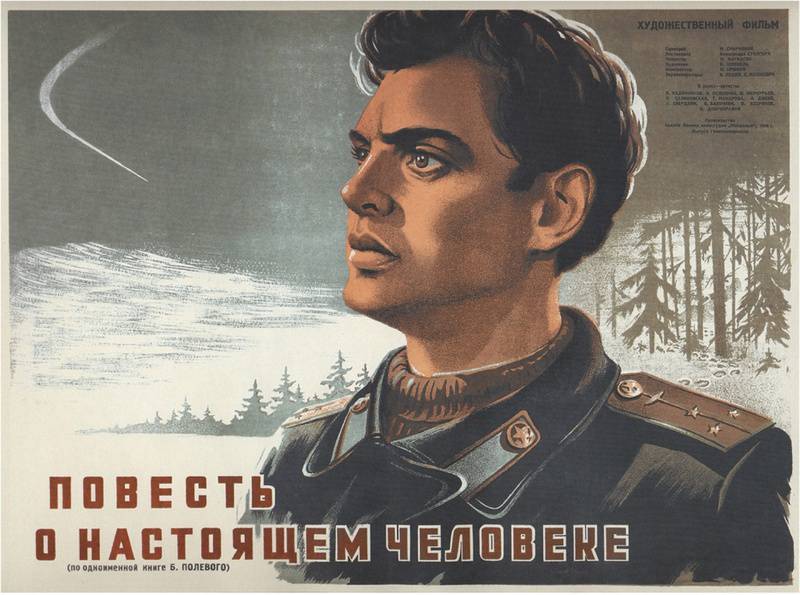
Maresyev reached the front again in June of the 1943 of the year, hitting the 63 of the Guards Fighter Aviation Regiment. Initially, the regiment Maresiev was not allowed to fly on combat missions. The regiment commander simply did not let the pilot go into battle, as the situation in the sky over the field of the future Kursk battle was extremely tense. Alex was very worried about this situation. As a result, the commander of one of the squadrons of the regiment, A. M. Chislov, sympathized with him. He took Maresyev on a pair of combat missions. As a result, several successful sorties together with Chislov helped to correct the situation, and the credibility of the pilot in the regiment increased.
20 July 1943 of the year during an air battle with the superior forces of the Germans Maresyev saved two Soviet pilots by shooting down two German Fw.190 fighters at once who were covering the Ju.87 dive bombers. Thanks to this, the military glory of Alexei Maresyev spread throughout the 15-th Air Army and across the front. In the 63 th Fighter Aviation Regiment, correspondents from all over the country became frequent, among whom was Boris Polevoy, the author of the future book The Tale of a Real Man.
It is surprising in this story that when he returned to the combat unit after amputation of both legs, Maresyev shot down 7 combat aircraft, bringing his list of air victories to 11 enemy vehicles. Then he was awarded the title Hero of the Soviet Union. In 1944, Alexei agreed to the proposal to become an inspector-pilot and move from the fighter regiment to the management of higher education institutions of the Air Force. The pilot himself honestly admitted that the loads on the flights only grew, and it became harder and harder to transfer them. At the same time, Maresyev never refused to take off combat missions, but he did not complain when he was offered a new job. As a result, in June 1944, the guard Major Alexei Maresyev accepted the offer to become an inspector.
In total, during World War II, Maresyev made 86 combat missions, shooting down 11 German planes: 4 before being wounded and 7 after. He was in military service until the 1946 year, until he retired for health reasons. In this case, the former fighter pilot tried to keep himself in very good physical shape. The man who lost his legs in the war was fond of skating, skiing, swimming and cycling. As a result, he even managed to set a record in the sanatorium near Kuybyshev, having swum the Volga here (2200 meters) in 55 minutes. His last sorties on an airplane (school U-2) Maresyev made at the beginning of the 1950-s, working as an instructor of the Air Force special school in Moscow.
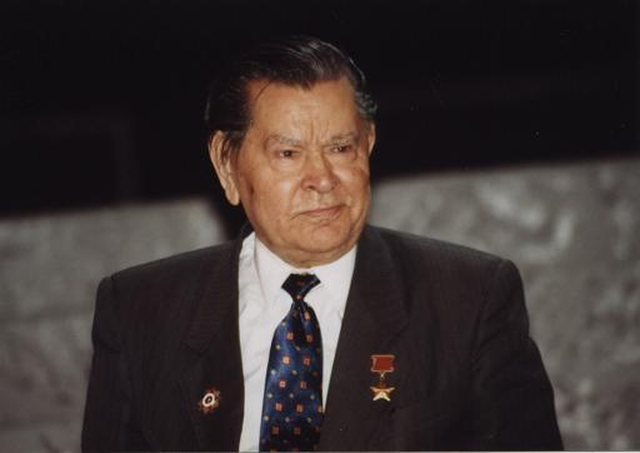
Alexey Petrovich Maresyev became the very man about whom you can talk all life - a feat. Especially since after the war, he still brought very great benefits to the country's air force, engaging in the process of training future pilots. In addition, since 1956, when the Soviet (and later Russian) committee of war veterans and military service was formed, retired colonel Maresyev headed it. He was in this public (but in his own way also a battle post) until the last days of his life.
Alexey Petrovich, in spite of everything, lived a long enough life. Somehow he managed to overcome the aftermath of a severe childhood and a wound received during the war. May 18 The 2001 of the year at the Theater of the Russian Army was to host a gala evening dedicated to the 85 anniversary of Alexei Maresyev. He was just about to come to this event, when a heart attack struck him, he was taken to the intensive care unit of a Moscow clinic, but the doctors could not save his life. As a result, the gala evening in his honor began with a moment of silence.
It often happens that a person who becomes a prototype of a book character in his life does not reach the image created by the writer. However, Maresyev is a living example of the opposite. He has proved with his whole life that the book “The Story of a Real Man” is not a colorful myth, but a real story that tells about the great courage and unsurpassed strength of the spirit of this person.
In honor of the centenary of the birth of the Hero of the Soviet Union and the famous pilot Alexei Petrovich Maresyev, a center for patriotic education will be opened in his small homeland in the city of Kamyshin, and a parade will be held with the participation of the Russian Knights and Swifts air groups, reports TASS. The name of Alexei Maresyev will be assigned to the plane EMERCOM of Russia and one of the new streets of Volgograd. In addition, commemorative events dedicated to the anniversary date will be held in Moscow, Tver and Nizhny Novgorod regions, as well as in other regions of Russia. In turn, the Russian military-historical society will continue the search for the Yak-1 fighter, which the pilot was shot down during an air battle near the Demyansky Boiler in 1942 year.
Based on materials from open sources
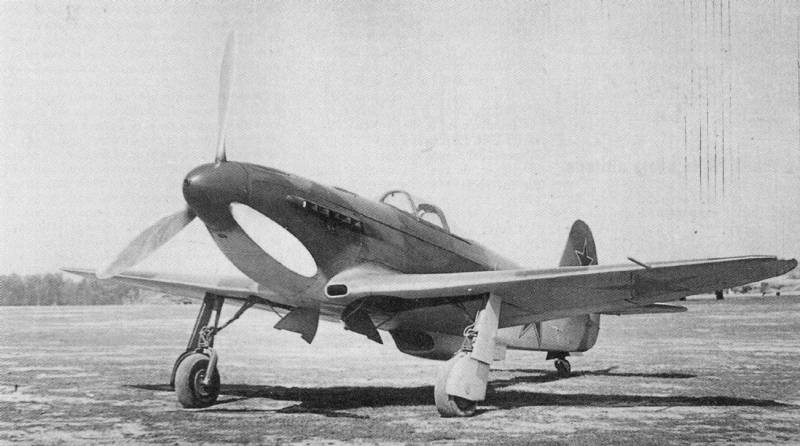
Information